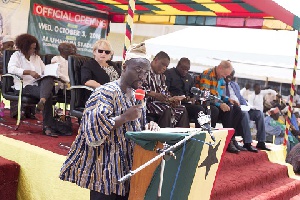Managing Director of Yara Ghana, Danquah Addo-Yobo has called on government through the Ministry of Food and Agriculture to ensure that inputs provided under the Planting for Food and Jobs Programme get to farmers in rural areas by placing more emphasis on input dealers with wider distribution network.
He said this at the Planting for Food and Jobs policy evaluation session at the just ended 8th Pre-harvest Agribusiness Conference and Exhibition held at the Aliu Mahama Sports Stadium, Tamale facilitated by Mr. Nicholas Issaka Gbana of the USAID.
In August 2017, President Akufo-Addo launched the Planting for Food and Jobs Policy to serve as a security for smallholder farmers who have since ages past been at the worst end of poverty despite being the providers of majority of food consumed in Ghana.
With this policy, seeds and fertilizers were given to small holder farmers with a farm size less than 5 acres at 50% discount and also on credit to be repaid after harvest.
One year down the line, arguably the biggest platform yet for a review of the program was provided at the just ended 8th Pre-harvest Agribusiness Conference and Exhibition.
The session took a detailed introspection into the Planting for Food and Jobs policy, looked at the high points, identified the problems and agreed on a solution to the said problems.
In his opening remark to update participants on progress made after one year of implementing the policy, Dr SethOseiAkoto, Director of Crops at the Ministry of Food and Agriculture said that a year since the implementation of the program, Ghana’s harvest for maize and rice have hit three hundred and five thousand (305,000) and one hundred and seventy-nine thousand (179,000) metric tonnes respectively.
“Seven Hundred and Forty-Five Thousand (745,000) direct and indirect jobs have been created over the same period”. He said.
Mr Seidu Haffis, a farmer from Upper West Region who was part of the panel to contribute from the farmer’s perspective shared his experience. He alluded to the relief brought to farmers by the programme and how inputs were made available to farmers as promised even though some farmers could not afford it despite the subsidy.
He also complained about distance from distribution centres to some farming communities and implored government to use nucleus farmers so that inputs get to farmers on time.
According to him, nucleus farmers are able to give inputs to farmers on credit and take part of their produce after harvest as repayment.
Sharing a UDS research and Evaluation of the program in the Northern Region with the house, Dr Danso Abbeam said that the program saw rice yield rise by 8%, soybeans 7.5% and maize 4%.
He indicated that most of the farmer involved in the research requested that the program is expanded to cover all agricultural input so that they can comprehensively rely on the program during the farming season.
Making his final remark, Mr Addo-Yobo called on all stakeholders to support government in the implementation of the Planting for Food and Jobs Policy because Ghana and especially the Northern Region has the ability to be the food hub of neighbouring African countries if the objectives of the programme are achieved.
Ending the session, Chief Executive Officer of Northern Development Authority, Dr Abdel Majeed Haroun assured the farmers that his outfit, is willing to collaborate with them to make the program successful and so they should be open to sharing ideas and solutions to improve the program and they will be implemented.
Business News of Thursday, 15 November 2018
Source: Media Harvest Event Ghana

















